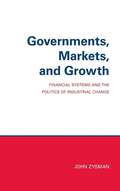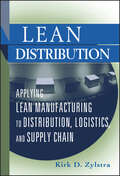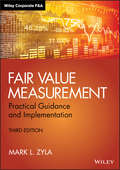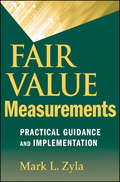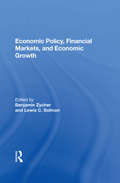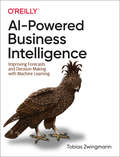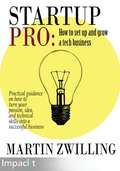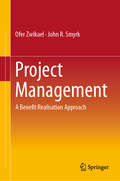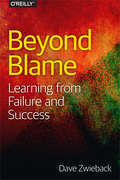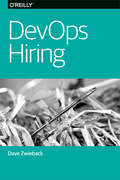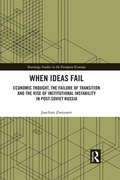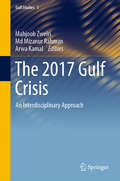- Table View
- List View
Sustainable Communities for a Healthy Planet
by Katharine ZywertSustainable Communities for a Healthy Planet presents an unconventional collection of ideas, practices, and ways of living together with the potential to enable long-term human and planetary health. Grounded in first-hand accounts from researchers, health practitioners, and social innovators across diverse fields, Katharine Zywert’s book argues that the most promising approaches often depart substantially from the incentive structures, goals, and mindsets that define the status quo and do not necessarily align with mainstream sustainability discourses. The book instead presents promising approaches that disrupt dominant ideas about mental health, ageing, and chronic illness; circumvent exploitative markets for medications, medical technologies, and professionalized care; attend not only to the health of individual human bodies, but to the health of internal ecologies, human populations, nonhuman species, and the planet as a whole; and embody alternative, more inclusive ways of practicing medicine within communities and ecosystems. The stories assembled in this book illustrate how human beings might live healthy lives, supported by health systems that are not dependent on perpetual economic growth. Sustainable Communities for a Healthy Planet challenges conventional ways of thinking about the future of health systems and asks hard questions about what it takes to cultivate human and planetary health in a time of rapid ecological, economic, and social change.
Governments, Markets, And Growth: Financial Systems And Politics Of Industrial Change (Cornell Studies In Political Economy Series)
by John ZysmanThe deterioration in the economic performance of the advanced industrial democracies during the 1970s has provoked an intense debate about the role of government in economic adjustment and growth. In Governments, Markets, and Growth, John Zysman makes a significant contribution to our understanding of these critical international issues by demonstrating that there is a direct relationship between a nation's financial system and its government's ability to restart the growth engine. Professor Zysman argues that there are three distinct types of financial systems, each with different consequences for the political ties between financial markets, industry, and government. Zysman tests his argument by analyzing and comparing the patterns of industrial adjustment in five advanced nations. He contrasts the differing strategies of industrial adjustments primarily in France and Great Britain, but also in Japan, West Germany, and the United States. Governments, Markets, and Growth will be invaluable to the international banking and business community, a wide variety of government officials, and students of political science, economics, and business administration.
Lean Distribution
by Kirk D. Zylstra"Kirk Zylstra's focus on the customer is a fresh approach to lean. Companies that can bear the burden of variability will develop a strategic advantage in today's volatile market."--Travis Jarrell Institute of Industrial Engineers Program Committee Chair"Lean Distribution is a comprehensive yet concise work with clear leanings. Kirk's experience across a range of industries brings a unique understanding of common opportunities and solutions available to optimize distribution processes. Lean techniques, typically effective in manufacturing processes, are applied in the downstream supply chain in a practical and productive manner that will offer something to any business distributing tangible goods."--F. Jeff Duncan Jr. VP, CIO, and Director of Technology Louisiana Pacific Corp."Lean Distribution has robustly captured the revolution occurring in today's increasingly competitive and global supply chain. Eliminating losses through lean manufacturing and lean distribution initiatives will become even more critical enablers to organizations developing cost-advantaged supply chains."--Rick McDonald Director of Manufacturing The Clorox Company
Fair Value Measurement: Practical Guidance and Implementation (Wiley Corporate F&A #634)
by Mark L. ZylaGet up to date on the latest FASB, SEC, and AICPA guidelines and best practices Fair Value Measurement provides hands-on guidance and the latest best practices for measuring fair value in financial reporting. The Financial Accounting Standards Board (FASB), the U.S. Securities and Exchange Commission (SEC), and the American Institute of CPAs (AICPA) have all updated their guidelines for practitioners, and this book details the changes from a practical perspective. This new third edition includes a discussion on Private Company Council accounting alternatives for business combinations and impairment testing, with a detailed example of the Market Participant Acquisition Premium (MPAP), including European and Asian examples and expanded discussion of IFRS. Ancillary materials including end-of-chapter questions and answers, PowerPoint slides, and a test bank help you quickly grasp the concepts presented, making this book ideal for both classroom and practitioner use. Fair value measurement guidelines continue to evolve, and this comprehensive reference provides a valuable, up-to-date resource for preparers, auditors, and valuation specialists. Adopt the best practices for implementing the FASB's Topic 820 Learn the latest reporting requirements for fair value measurements Understand accounting alternatives for business combinations Examine the details of MPAP in Europe and Asia Applying fair value measurements to financial statements requires a move away from rules-based standards and toward application of professional judgment. This controversial shift has led to a reliance on valuation specialists, who face their own challenges in applying Topic 820 amidst an economic downturn and recovery, leading to an ever evolving set of best practices. Practitioners must stay up to date, and be aware of the changes as they occur. Fair Value Measurement provides the most recent information and a practical approach to this area of financial reporting.
Fair Value Measurements
by Zyla Mark L.A hands-on volume for financial executives with guidance on the fair value measurement process In today's dynamic and volatile markets, whether buying or selling, what corporate officers need to know is the worth of an asset today, a task that for many has become complex and at times confusing. Fair Value Measurements: Practical Guidance and Implementation demystifies this topic, offering you a nuts-and-bolts guide of the most recent developments in preparing financial statements using fair value measurements. This straightforward book covers the best practices on measuring fair value in a business combination and how to subsequently test the value of these assets for impairment. Filters complicated insider concepts into easy-to-understand information on the valuation specialist's function Discusses the many new FASB pronouncements involving fair value Instantly familiarizes you on the ins and outs of fair value financial disclosure Well-written, conversational in tone, and filled with valuable insights, Fair Value Measurements: Practical Guidance and Implementation lifts the veil of confusion from the substantial and growing requirements for fair value disclosures.
Sharing the Burden?
by Benjamin ZylaSince the fall of the Berlin Wall, NATO's middle powers have been pressured into shouldering an increasing share of the costs of the transatlantic alliance. In Sharing the Burden? Benjamin Zyla rejects the claim that countries like Canada have shirked their responsibilities within NATO.Using a range of measures that go beyond troop numbers and defense budgets to include peacekeeping commitments, foreign economic assistance, and contributions to NATO's rapid reaction forces and infrastructure, Zyla argues that, proportionally, Canada's NATO commitments in the 1990s rivaled those of the alliance's major powers. At the same time, he demonstrates that Canadian policy was driven by strong normative principles to assist failed and failing states rather than a desire to ride the coattails of the United States, as is often presumed.An important challenge to realist theories, Sharing the Burden? is a significant contribution to the debate on the nature of alliances in international relations.
Forest Industry of Russia: Smart Innovations and Success Stories (Advances in Sustainability Science and Technology)
by Sergey V. Zykov Dennis V. DaynekoThis book focuses on crisis management in forest industry of Russia. It is about the present, and the future, with a short retrospective about the past of the forest industry in Russia. It includes forecasting too and description of some of the best practices of developed countries to be implemented in Russia to overcome the crisis. The main theme of the book is smart innovations and innovative activities introduced and also those which are required in the forest industry of Russia. The book considers the effectiveness of innovations and institutional changes in the forest industry, which are an important direction of innovation activities required all together with technological and economic breakthrough with ecological aspects in priority. The necessity to implement the modern innovation system in the forest industry based on institutional changes is substantiated and thoroughly explained with successful examples of ongoing and future up-to-date smart innovations. The development of the forest innovation system is suggested for sustainable forest industry management; the key components of which are technological, product, institutional, and ecological innovations, as well as, innovative entrepreneurship. Realization of the innovation system for technological and intellectual improvement requires good scientific and personnel provision, anticipation of markets and tendencies of development for some decades ahead. The implied advanced technologies in the forest industry also include IT-, nano-, and biotechnologies. The success stories of the leading Russian and international companies in the forest industry of Russia are studied attentively in the book. The book presents a profound methodical and theoretical substantiation for the further implementation of the smart innovations and of the successful experience of the industry leading companies.
IT Crisisology: Models, Methods, Patterns, Practices, Case Studies (Smart Innovation, Systems and Technologies #210)
by Sergey V. ZykovThis book focuses on crisis management in software development which includes forecasting, responding and adaptive engineering models, methods, patterns and practices. It helps the stakeholders in understanding and identifying the key technology, business and human factors that may result in a software production crisis. These factors are particularly important for the enterprise-scale applications, typically considered very complex in managerial and technological aspects and therefore, specifically addressed by the discipline of software engineering. Therefore, this book throws light on the crisis responsive, resilient methodologies and practices; therewith, it also focuses on their evolutionary changes and the resulting benefits.
IT Crisisology Casebook: Smart Digitalization for Sustainable Development (Smart Innovation, Systems and Technologies #300)
by Sergey V. ZykovThe book focuses on the real-world case-based crisis management in digital product development. This includes forecasting, responding, and agile engineering/management methods, patterns, and practices for sustainable development. This book introduces a set of case studies for sustainability in management as a blend, the components of which have been carefully selected from a few domains adjacent to digital production such as IT-intensive operation, human resource management, and knowledge engineering, to name a few. The key ingredients of this crisis management framework include information management, tradeoff optimization, agile product development, and knowledge transfer. The case studies this book features will help the stakeholders in understanding and identifying the key technology, business, and human factors that may likely result in a digital production crisis, i.e., critically affect the organization outcomes in terms of successful digitalization and sustainable development. These factors are particularly important for the large-scale applications, typically considered very complex in managerial and technological aspects, and, therefore, specifically addressed by the discipline of IT crisisology.
Einführung in die Medienwirtschaftslehre
by Christoph ZydorekWelche medienökonomischen Anknüpfungspunkte haben speziell Studierende als Abnehmer und künftige Produzenten von Medien? Diese Einstiegsfrage verdeutlicht auf einfache Weise die Sinnhaftigkeit einer systematischen Durchdringung des Themas Medienökonomie und führt die wichtigsten Begriffe ein: Medien, Inhalt, Wertschöpfung, Güter, Bedürfnisbefriedigung mit Medien, Medien als Wirtschafts- und Kulturgüter. Christoph Zydorek stellt die drei Haupt-Akteurstypen (Rezipient, Medienunternehmen, werbetreibende Wirtschaft) auf Medienmärkten mit ihren jeweiligen Handlungsmotivationen sowie danach die zentralen Eigenschaften von Mediengütern vor. Darauf aufbauend können einige Mainstream-Handlungskonzepte aus der Sicht der Hersteller von Mediendienstleistungen diskutiert werden: Preis- und Erlöspolitik, Bündelung, Versionierung, Windowing. Das Lehrbuch dient als Einführung in die Grundfragen und als Vorbereitung auf eine tiefergehende Durchdringung des medienwirtschaftlichen Handlungsbereichs.
Einführung in die Medienwirtschaftslehre
by Christoph ZydorekDas Lehrbuch dient als Einführung in die Grundfragen und als Vorbereitung auf eine tiefergehende Durchdringung des medienwirtschaftlichen Handlungsbereichs. Welche medienökonomischen Anknüpfungspunkte haben speziell Studierende als Abnehmer und künftige Produzenten von Medien(inhalten)? Diese Einstiegsfrage verdeutlicht auf einfache Weise die Sinnhaftigkeit einer systematischen Durchdringung des Themas Medienökonomie auf dem Niveau einer Einführung für das Grundstudium in Medienstudiengängen. Das Lehrbuch führt die wichtigsten Begriffe ein: Medienträger, Content, Wertschöpfung, Güter, Bedürfnisbefriedigung mit Medien, Medien als Wirtschafts- und Kulturgüter. Christoph Zydorek stellt die drei Haupt-Akteurstypen (Rezipient, Medienunternehmen, Werbetreibende Wirtschaft) auf Medienmärkten mit ihren jeweiligen Handlungsmotivationen sowie die zentralen Eigenschaften von Mediengütern vor. Die 2. Auflage wurde grundlegend überarbeitet und aktualisiert.
Einführung in die Medienwirtschaftslehre
by Christoph ZydorekDas Lehrbuch dient als Einführung in die Grundfragen und als Vorbereitung auf eine tiefergehende Durchdringung des medienwirtschaftlichen Handlungsbereichs. Welche medienökonomischen Anknüpfungspunkte haben speziell Studierende als Abnehmer und künftige Produzenten von Medien(inhalten)? Diese Einstiegsfrage verdeutlicht auf einfache Weise die Sinnhaftigkeit einer systematischen Durchdringung des Themas Medienökonomie auf dem Niveau einer Einführung für das Grundstudium in Medienstudiengängen. Das Lehrbuch führt die wichtigsten Begriffe ein: Medienträger, Content, Wertschöpfung, Güter, Bedürfnisbefriedigung mit Medien, Medien als Wirtschafts- und Kulturgüter. Christoph Zydorek stellt die drei Haupt-Akteurstypen (Rezipient, Medienunternehmen, Werbetreibende Wirtschaft) auf Medienmärkten mit ihren jeweiligen Handlungsmotivationen sowie die zentralen Eigenschaften von Mediengütern vor. Die 3. Auflage wurde grundlegend überarbeitet und insbesondere im Hinblick auf digitale und soziale Medien aktualisiert.
KI in der digitalisierten Medienwirtschaft: Fallbeispiele und Anwendungen von Algorithmen
by Christoph ZydorekDie Entwicklungstrends in der fortschreitenden Algorithmisierung des Mediensektors werden in diesem Band für verschiedene Teilsektoren der Medien (Games, Musik, Bücher, Audio/Video, Nachrichtenmedien) anhand aktueller Beispiele aus der Forschung, der Entwicklung und der Praxis der Medienwertschöpfung demonstriert. Es erweist sich, dass zunehmend mehr und größere Tätigkeitsbereiche, die früher ausschließlich durch menschliche Arbeitsleistung, professionelle Gestaltungskompetenz und Kreativität geprägt waren, durch unterschiedliche Formen automatisierter und zunehmend „intelligenter“ Routinen übernommen werden. Die diesen Routinen innewohnenden ökonomischen Rationalisierungspotenziale treiben den Prozess der Ersetzung menschlicher Arbeit durch Kapital in der Wertschöpfungskette der Medieninhalte schnell und tiefgreifend voran.
Economic Policy, Financial Markets, And Economic Growth ([the Milken Institute Series In Economics And Education])
by Benjamin ZycherThe links between economic policy and economic growth are simultaneously obvious and obscure, with many factors interacting to influence the overall process. The list of relevant parameters affecting economic growth of interest to scholars and policymakers is lengthy and expanding. Although the importance of government policy is widely recognized,
The Routledge Companion to Libertarianism (Routledge International Handbooks)
by Matt ZwolinskiHave you ever wondered what libertarians think about vaccine mandates? About gun control? About racial and sexual inequalities? While libertarianism is well known as a political theory relating to the scope and justification of state authority, the breadth and depth of libertarian work on a wide range of other topics in social and political philosophy is less well known. This handbook is the first definitive reference on libertarianism that offers an in-depth survey of the central ideas from across philosophy, politics, and economics, including applications to contemporary policy issues. The forty chapters in this work provide an encyclopedic overview of libertarian scholarship, from foundational debates about natural rights theories vs. utilitarian approaches, to policy debates over immigration, punishment and policing, and intellectual property. Each chapter presents a comprehensive and up-to-date overview of historical and contemporary libertarian thought on its subject, and thus serves as an essential guide to current scholarship, and a starting place for discovering future lines of research. The book also contains a section on criticisms of libertarianism, written by leading scholars from the feminist, republican, socialist, and conservative perspectives, as well as a section on how libertarian political theory relates to various schools of economic thought, such as the Chicago, Austrian, Bloomington, and Public Choice schools. This book is an essential and comprehensive guide for anyone interested in libertarianism, whether sympathizer or critic.
AI-Powered Business Intelligence: Improving Forecasts And Decision Making With Machine Learning
by Tobias ZwingmannUse business intelligence to power corporate growth, increase efficiency, and improve corporate decision making. With this practical book with hands-on examples in Power BI, you'll explore the most relevant AI use cases for BI, including improved forecasting, automated classification, and AI-powered recommendations. And you'll learn how to draw insights from unstructured data sources like text, document, images files.Author Tobias Zwingmann helps BI professionals, business analysts, and data analytics understand high-impact areas of artificial intelligence. You'll learn how to leverage popular AI-as-a-service and AutoML platforms to ship enterprise-grade proofs of concept without the help of software engineers or data scientists.Learn how AI can generate business impact in BI environmentsUse AutoML for automated classification and improved forecastingImplement recommendation services to support decision-makingDraw insights from text data at scale with NLP servicesExtract information from documents and images with computer vision servicesBuild interactive user frontends for AI-powered dashboard prototypesImplement an end-to-end case study for building an AI-powered customer analytics dashboard
StartupPro: How to set up and grow a tech business
by Martin ZwillingIf your find yourself daydreaming about your own business and not just your next promotion, this book will help you shape your ideas as you begin your enrepreneurial journey.
Project Management: A Benefit Realisation Approach
by Ofer Zwikael John R. SmyrkThis book is a complete project management toolkit for project leaders in business, research and industry. <P><P> Projects are approved and financed to generate benefits. Project Management: A Benefit Realisation Approach proposes a complete framework that supports this objective – from project selection and definition, through execution, and beyond implementation of deliverables until benefits are secured. <P><P> The book is the first to explain the creation of organisational value by suggesting a complete, internally-consistent and theoretically rigorous benefit-focused project management methodology, supported with an analytical technique: benefit engineering. Benefit engineering offers a practical approach to the design and maintenance of an organisation’s project portfolio. <P><P> Building upon the authors’ earlier successful book, Project Management for the Creation of Organisational Value, this comprehensively revised and expanded new book contains the addition of new chapters on project realisation. The book offers a rigorous explanation of how benefits emerge from a project. This approach is developed and strengthened — resulting in a completely client-oriented view of a project. <P><P> Senior executives, practitioners, students and academics will find in this book a comprehensive guide to the conduct of projects, which includes robust models, a set of consistent principles, an integrated glossary, enabling tools, illustrative examples and case studies.
Beyond Blame
by Dave ZwiebackFailure is inevitable and a postmortem analysis, conducted in an open, blameless way, is the best way for IT techs and managers to learn from outages and near-misses. But when the "root cause" is determined to be "human error" (or worse, particular humans), the real causes and conditions are lost.In this insightful book, IT veteran Dave Zwieback shows you an approach for making postmortems blameless, so you can focus instead on addressing areas of fragility within systems and organizations. If you're involved with assessing why something goes wrong on a project or at your company--as a system administrator, developer, team manager, or executive--the concrete steps in this guide will help you find a real solution that works.Recognize and mitigate the effects of stress during outagesLearn how to communicate effectively in a charged, high-stakes postmortem conversationCollect the necessary data before the postmortem beginsFocus on determining the actual causes and conditions of an outageLearn techniques for writing up a postmortem for either internal or external use
DevOps Hiring
by Dave ZwiebackIf your organization has embraced DevOps, you need people whose nonlinear career paths and wide-ranging interests will help you remove dysfunctional silos. But your efforts to hire DevOps practitioners aren't working. How do you unearth these DevOps creatures? Think like one.In this Web Ops & Performance report, Dave Zwieback describes a successful model for finding, hiring, and retaining talent based on the DevOps philosophy of Culture, Automation, Measurement, and Sharing.This concise report covers:Why the current recruiting model is brokenHow a culture of engagement gives candidates, recruiters, and hiring managers a common goalFinding "dark pools" of candidates via automationWhat attractive metrics to ditch in order to focus on what's business-criticalSharing the rich opportunities of failures as well as successesDownload this free report to learn unorthodox but effective ways to find people who fit your company, and discover why prioritizing employee engagement and fulfillment leads to increased productivity, profits, and customer satisfaction.Dave Zwieback has been managing large-scale, mission-critical infrastructure and teams for 17 years.
The Human Side of PostMortems: Managing Stress And Cognitive Bias In Devops
by Dave ZwiebackMost postmortem writeups follow a predictable, linear format, writtenfrom a point of view of an omniscient narrator: 1) The outage happened (the acknowledgement) 2) Here's what we found out (the reasons) 3) Here's what we're doing to make sure this doesn't happen again (the remediation) 4) Sorry about that! (the apology) What's almost always missing is any discussion of what people working under extreme stress experienced (confusion, frustration, anger, elation, etc.), what cognitive biases clouded their thinking, how they made decisions with imperfect information, what communication patterns worked or failed, etc. Call this the human -- emotional or psychological -- postmortem. This report explains why the human postmortem is as important as the technical one. Learn how it allows for building more resilient teams and processes, and ultimately reduces the duration and severity of future outages.
Unternehmenskrisen bewältigen: Die Bedeutung der Persönlichkeit für erfolgreiches Management in der Krise
by Patrick ZwickDieses Buch vermittelt grundlegende Kenntnisse zu Krisenursachen, den Phasen krisenhafter Entwicklungen, typischen Krisen im Lebenszyklus eines Unternehmens und den Aufgaben eines Krisenmanagers.Es geht dabei der Frage nach, welche Rolle die Persönlichkeit von Managern in der Unternehmenskrise spielt. Sie erfahren, welche Persönlichkeitsmerkmale eines Managers in der Krise den entscheidenden Unterschied machen können.Ein wertvoller Helfer für Gesellschafter, Unternehmensberater, Führungskräfte, die sich in der Praxis mit der Sanierung und Restrukturierung von Unternehmen beschäftigen.
When Ideas Fail: Economic Thought, the Failure of Transition and the Rise of Institutional Instability in Post-Soviet Russia (Routledge Studies in the European Economy)
by Joachim ZweynertIn the history of Russian economic ideas, a peculiar mix of anthropocentrism and holism provided fertile breeding ground for patterns of thought that were in potential conflict with the market. These patterns, did not render the emergence of capitalism in Russia impossible. But they entailed a deep intellectual division between adherents and opponents of Russia’s capitalist transformation that made Russia’s social evolution unstable and vulnerable to external shocks. This study offers an ideational explanation of Russia’s relative failure to establish a functioning market economy and thus sets up a new and original perspective for discussion. In post-Soviet Russia, a clash between imported foreground ideas and deep domestic background ideas has led to an ideational division among the elite of the country. Within economic science, this led to the emergence of two thought collectives, (in the sense of Ludvik Fleck), with entirely different understandings of social reality. This ideational division translated into incoherent policy measures, the emergence of institutional hybrids and thus, all in all, into institutional instability. Empirically, the book is based on a systematic, qualitative analysis of the writings of Soviet/Russian economists between 1987 and 2012. This groundbreaking book makes an important contribution to Central Eastern and Eastern European area studies and to the current debate on ideas and institutions in the social sciences.
Six Figure Salary Negotiation: Industry Insiders Get You the Money You Deserve
by Michael ZwellMore than 7 million Americans make six-figure salaries--and you can be one of them! Corporate recruiter Michael Zwell uses his twenty-five years of experience to show you how to reach that goal. And he brings you insider advice about salary negotiation from top business leaders, including: Robert Wright of the Wright Institute; Donald P. Delves of the Delves Group; Catherine Candland of Advantage Human Resourcing; Stan Smith of Smith Economics Group; Tom Terry of CCA Strategies; Judith Wright of the Wright Institute; Mylle Magnum of IBTWilliam J. White of Bell & Howell. These industry insiders show you how to negotiate a satisfying job offer or raise. They tell you how to ask the right questions and how to close a job offer at the right moment for the best salary and benefits. With these experts at your side, you'll get the salary and benefits you deserve.
The 2017 Gulf Crisis: An Interdisciplinary Approach (Gulf Studies #3)
by Mahjoob Zweiri Md Mizanur Rahman Arwa KamalThis book provides an overview of the origins, repercussions and projected future of the ongoing Gulf crisis, as well as an analysis of the major issues and debates relating to it. The Gulf region witnessed an extraordinary rift when, on 5 June 2017, Saudi Arabia, the United Arab Emirates and Bahrain cut all diplomatic ties and imposed a siege on the State of Qatar following the hacking of the Qatar News Agency website. This book approaches the Gulf crisis from an interdisciplinary perspective by bringing together a group of top scholars from a wide range of disciplines and areas of expertise to engage in a nuanced debate on the current crisis. With the pressing role of media in general and social media in particular, new political realities have been created in the region. The book addresses the role that cyber and information security play on politics, as well as the shift of alliances in the region as a result of the crisis. It scrutinizes the role of media and information technology in creating political cultures as well as conflicts. The book also explores the long-term economic implications of the siege imposed on Qatar and identifies how the country's economy is adjusting to the impact of the siege. Thus, the book considers the extent of social and economic changes that the crisis has brought to the region. This book invites in-depth understanding of the regional crisis and its implications on nation building and the reconfiguration of political and economic alliances across the region. It will appeal to a broad interdisciplinary readership in the area of Gulf studies.

